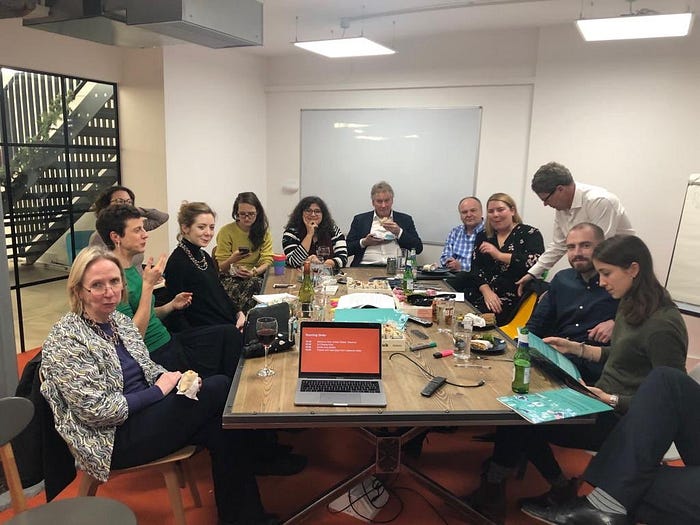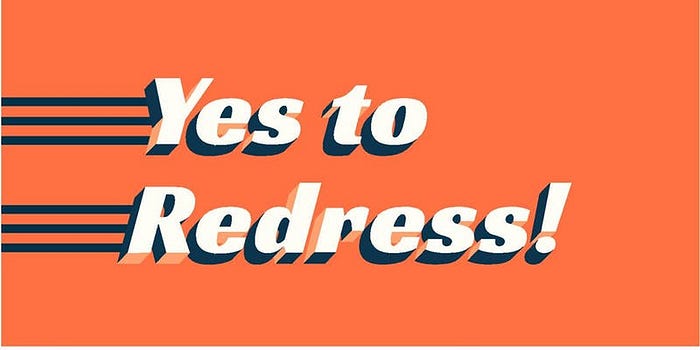Yes To Redress!
How can we make it easier for people to seek redress in the digital world?

Earlier this month with Resolver, the free online tool designed to make complaining quick and easy, we hosted the first in a series of three Yes to Redress! meet-ups.
Here’s a summary of the conversation at the first meet-up held on 5 December 2018, and introduction to some of our plans for how to champion and improve redress in the digital world into 2019 and beyond.
Why say Yes to Redress!?
Doteveryone cares about redress for a number of reasons.
For individuals, clear and easy access to redress means they are better able to hold tech companies to account when their digital rights have been breached.
For companies, showing users they are committed to tackling the problems they may encounter on their services earns trust, driving them towards more responsible practices.
For society as a whole, redress can help to shift the power imbalance between the public and multinational tech giants towards a fairer equilibrium.
What are the current problems with redress in the UK?
On 5 December 2018, the DCMS Committee released the first wave of documents seized from app developer Six4Three relating to their ongoing legal dispute with Facebook. The documents offer an intimate insight into Facebook’s corporate culture. They raise questions about their aggressive approach to competitors and the opacity of how they communicate their data use practices to the public.
So having this first meet-up the very same evening, and to be joined by the Committee’s Special Advisor, Dr Charles Kriel, was particularly timely!
Dr Kriel kicked off the evening’s discussions with his reflections on the implications of these revelations on the UK’s redress system. We then, with civil society organisations, lawyers, activists and consumer advocates, moved into a broader discussion on some of the challenges currently facing the system.
In summary, these include:
- Low public understanding of the rights they have online and how they can protect them. And even when they are aware of their rights, people simply lack the time to navigate the complexities of current redress systems.
- Large companies lack incentives to support users and consumers. Light-touch regulation and the complexities of setting up systems that don’t become swamped by massive user-bases mean many are simply avoiding the issue.
- Products are designed to “maximise engagement, which is a polite word for addiction”. And some areas of the digital economy — like online gaming — are particularly lacking in consumer protections and design.
- Rating systems for online marketplaces could be better. Many are easily gamed, and when average rating scores are universally high it’s difficult for the public to differentiate between services.
- Initiatives which provides users with information on their personal engagement with digital services and platforms only give the illusion of control. Tools such as screen-time reporting are “like locking an alcoholic in a cupboard full of alcohol where they can count the bottles they’ve consumed”
- The courts are unable to offer the public the level of protection they need against digital harms with a legal system that is prohibitively expensive for most, and a police-force swamped by growing caseloads of more serious crimes.
But we did more than just moan about the issues. There are a number of opportunities:
- A public conversation around online harms is developing. Although at an early stage, awareness appears to be increasing in the wake of ongoing digital controversies in the past year.
- There are examples of good redress systems and regulation out there— like payday lending — and we have templates to learn from when thinking about redress in the digital world.
- Several civil society groups and consumer advocacy groups are doing excellent work in this area. We have an opportunity to build a strong coalition behind better redress! 💪

So what happens now?
The next Yes to Redress! meet-up will be 18.30–20.00, Wednesday 6 February where we’ll be asking: what does “good” redress look like?
To sign-up visit our Eventbrite page.
In early 2019 we’re also going to explore ways to gather better data on digital harms and promote redress to the public. Watch this space! 👀
